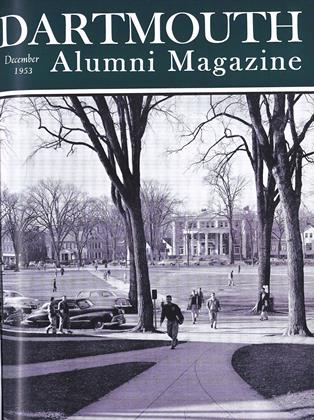WRITING a daily or even a weekly column must require a specialized hardihood that we could never hope to achieve. Our model would, of course, be Romeyn Berry, whose combination of nostalgia, cow lot philosophy, and Ithacan sharp talk has charmed generations of Cornellians. F.P.A. we worshipped this side idolatry, even turning Democrat when he shifted to the World. A cosmic as well as personal loss was suffered when Bert Taylor wrote 30 before he had completed his saga of the man in the pink shirt. And we have from time to time revered the outpourings of Bennett cerf, Red Smith, and Skip the Shoveler.
Most of these, however, have dished to a general audience whose common denominator is the yen for a particular offering. An alumni body presents a slightly more specialized problem, with a common interest that time cannot wither but that custom may well stale. For the greater part, workers in the pleasant vineyard of Hanover are dealing with an unaging and unending undergraduate parade like Macbeth's "Show of Eight Kings; the last with a glass in his hand," or a road company's paltry personnel simulating a regiment for the Soldiers' Chorus of Faust. Alumni dealing on the contrary must be with crabbed age and youth simultaneously, and one man's meat is another man's gefullte fish. We must don our space hat and enter our time machine before we venture specific references. There are those who hold for Joe Gilman and Henry Hooper. Others pontificate on the glories of Milt Ghee and Fat Spears. Many deem unexcelled the era of Oberlander and Tully and Sage, while for later cabals the lights went out all over the world with the departure of A1 Marsters and Bill Morton, or of Bob MacLeod and Mutt Ray, or Meryll Frost and John Clayton. We loved them all, but our next pet is some youngster in the Class of '58 or '59 who is still, "like the man who comes about the gas, unasked, unblessed, unkissed, and unconcerned."
Nevertheless, we find it barely possible to escape dating ourself, no matter how gaily we scatter references to the Time of Jubilo (to charm the Class of 1862), or denominate as "cool" (to get through to the current generation) objets d'estime that are obviously "hot." We frequently feel as aged as the fellow who wrote Annie Laurie and never got an answer, but we were heartened recently when our 18-year-old asked us if we had heard a sharp number entitled Ja-da. One thing, however, that we now constantly tell ourself, as we have often wished to tell our elders, is that reminiscences about characters and events unfamiliar to our hearers are, to say the least, anaphrodisiac. We lately recounted some excruciating fragments of memorabilia to an undergraduate whom we will here call Lonnie, and were met with the blandest of unconcern. Granted that Lonnie has only two real loves: a hot trombone and Lonnie, he endured our sallies with all the relaxation of a judge at the finish of the two-mile run.
Everybody is, quite properly, concerned with his entity and thinks of old So-and-so as one of his profs rather than considering himself merely as one of old So-and-so's students. In our earlier and more contemplative days we occasionally were sharply aware of our being, and thought how strange and exciting it was that we, an individual, should be standing at that particular moment on, for example, the station platform in Zagreb instead of somewhere else; though no doubt the station platform in Zagreb felt similar concern about being cluttered with such an unprofitable customer. We can be as self-centered as the next fellow, and assume that we have an unlimited number of gear ratios selected by a magic brain; but we do not hold with the conclusions of a statistical study from M.I.T. proving that people are no damn good. We like people a greater part of the time, and we think that the Class of 1957 holds more current promise than the Class of 1857, or even than the Class of 1919.
"And ye, red-lipped and smoothbrowed, list...
Much is there waits you we have missed;
Much lore we leave you worth the knowing,
Much, much has lain outside our ken ..
 View Full Issue
View Full Issue
More From This Issue
-
 Article
ArticleBIGNESS
December 1953 By DAVID E. LILIENTHAL -
 Article
ArticleCharles Ransom Miller '72
December 1953 By JOHN HURD '21 -
 Class Notes
Class Notes1918
December 1953 By ERNEST H. EARLEY, w. CURTIS GLOVER, RICHARD P. WHITE -
 Class Notes
Class Notes1935
December 1953 By HENRY R. BANKART, JOHN WALLACE -
 Class Notes
Class Notes1931
December 1953 By Lambert & Feasley, Inc., PETER B. EVANS, CHARLES S. MCALLISTER -
 Article
ArticleA True Dog Story
December 1953 By A. I. Dickerson
BILL McCARTER '19
-
 Article
ArticleNot So Long Ago .... Peerades
November 1933 By Bill McCarter '19 -
 Article
ArticleThe Hanover Scene
November 1954 By BILL McCARTER '19 -
 Article
ArticleThe Hanover Scene
January 1958 By BILL McCARTER '19 -
 Article
ArticleThe Hanover Scene
February 1958 By BILL McCARTER '19 -
 Article
ArticleThe Hanover Scene
May 1958 By BILL McCARTER '19 -
 Article
ArticleTHE HANOVER SCENE
MAY 1959 By BILL McCARTER '19
Article
-
 Article
ArticleBibliography of Samuel Lorenzo Knapp
December 1936 -
 Article
ArticleCouncil Member
December 1938 -
 Article
ArticleBoston Alumni Salute Loyal Helpers
MARCH 1959 -
 Article
ArticleTrustee-Faculty Agreement
MAY 1971 -
 Article
ArticleTHE PROBLEM REMAINS
By S. H. Silverman '34 -
 Article
ArticleClass Reunion
April 1961 By VINCENT P. O'REILLY '21

